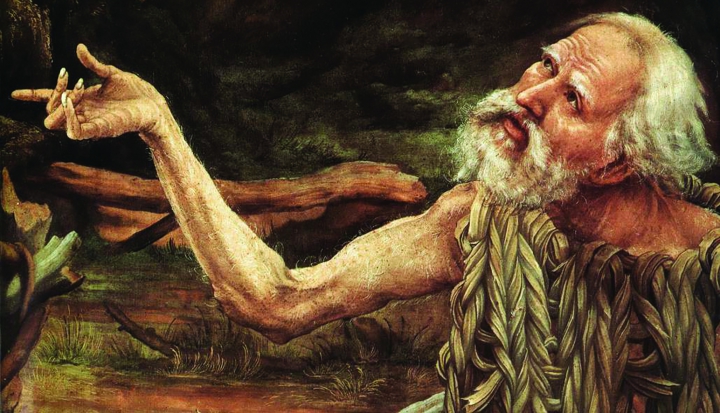Life is more than we bargain for. The election results last November proved that, in an hour of frank astonishment for every side of the social debate. Behold, all things are new and all bets are off! It’s a brave new world. Even the most discerning among us has no idea what’s next on the horizon.
One might say this was the keenest lesson learned last year, the loudest message communicated by the election results. Old things have passed away, and new things have come to take their place. And God bless America, a land in which the reinvention of society is our oldest and hardiest legacy.
All things are new. Don’t presume more of the same. This is always true, of course; but to coin a phrase from Animal Farm, it seems more true than usual these days. We might wonder: Did the world feel novel and unfamiliar to St. Paul when he staggered out of his lifelong Pharisaical certitude about what God wants and how religion works and into the bold light of Christ?
We hear again and again in Luke’s narrative of the Acts of the Apostles, as well as in Paul’s personal correspondence, how his encounter with Jesus on the road to Damascus rendered Paul not marvelously all-seeing but quite blind at first. It’s one of the most intriguing aspects of his conversion story. Don’t we expect that stepping into the light of Christ will enable us to see plainly, if not more lucidly, than ever before? Rather than instantly becoming the wise, mystically perceptive apostle we consider him today, Paul met Jesus and was plunged into a season of doubt, confusion, and stumbling in the dark.
We seek clarity and certainty. Human beings thrive in the comfort of secure routines and firm answers. But time often delivers curveballs, detours, surprises, and shocks. These can be exciting or unpleasant, the realization of barely dreamt hopes as well as the incarnations of our most dreaded monsters.
Newness, however we define it, doesn’t always come wrapped as a gift and tied up with a neat bow. Newness can lead to chaos, anxiety, the sense that control is slipping away or that change is leaving us stranded on the dry dock of history. Every time I’m obliged to upgrade my technology, the ensuing dismay feels like a death. I used to know which key to hit to get the desired results. Now that key isn’t there. Maybe the function I wish to engage doesn’t exist anymore, period. Maybe there’s no way to connect my desire to its fulfillment, and I have to learn to want something else. This can be a disorienting experience.
St. Paul fell off a ledge when he met Jesus and plunged into the abyss. Paul went from a life of total control to theological and moral chaos. As a Pharisee, he’d enjoyed the knowledge that satisfying hundreds of minute traditional laws and rituals guaranteed him the favor of God and a virtuous life. In addition, he earned the esteem of his fellow citizens, who revered Pharisees as walking saints. Pharisees were dedicated to observing the law of God perfectly. They were professional moral perfectionists. They showed the rest of us how it’s done, a service for which they were highly respected and lavishly treated.
Encountering the risen Lord, Paul’s visions of God and how to live were completely shattered.
No wonder the light of this new revelation temporarily blinded him. No wonder Paul disappears from the story for a time, even after he recovers his physical sight—spending three years, according to his own account in Galatians, in Arabia, a reference that is remarkably unspecific.
What Paul did during his hiatus is a mystery. Did he go back to school, so to speak, as a Christian, learning how to think about God all over again? Did he sit in silent humility, pondering the crucial event that eclipsed his former arrogant assurance about how things work? Did he, in his obscurity, try out new ways of teaching or preaching the gospel that had come to him? Did it just take him that long to catch his breath?
Embracing newness as a mandate for spiritual growth isn’t a Pauline principle alone. New moons and new years were long celebrated in ancient religions of the region. Many Hebrew psalmists urge the singing of a “new song” before the Lord, suggesting God is as uninterested in hearing “the same old song” from faithless Israelites as we are disgusted by family members who continue to promise and fail to deliver on new behaviors.
While the pessimistic speaker in Ecclesiastes insists, “there is nothing new under the sun” (1:9), prophets heartily disagree. Mortals may add little that’s fresh to history, yet God generates a constant fountain of hopes unknown till now: “I am about to do a new thing; now it springs forth, do you not perceive it?” (Isaiah 43:19). God has a promise in store that eclipses all earlier ones: “The days are surely coming, says the Lord, when I will make a new covenant with the house of Israel and the house of Judah” (Jeremiah 31:31). The freshness of God transforms us interiorly: “A new heart I will give you, and a new spirit I will put within you” (Ezekiel 36:26).
This tradition of surpassing traditions is not lost on Jesus, who expects newness from his disciples. He tells Nicodemus that no one enters the kingdom without being “born from above” (John 3:3)—the origin of the term “born-again.” It’s a radical idea, to start over from scratch, to learn how to talk and walk and think and behave as if re-parented “from above.” Jesus teaches that his new wine must be stored in new skins or the seams of the old containers will burst. What he offers is simply too expansive to be contained by the constraints of old-think.
When Jesus is teaching, all who listen know they’re hearing someone who speaks with new authority. He’s not at all like other rabbis who quote time-honored teachings but do not touch the pain of their present generation—or tired moralists today who keep insisting our 21st-century realities fit into cramped medieval understandings. Jesus does not come to reinforce old patterns but to provide “good news.” He brings a new commandment that summarizes and surpasses all the rest.
So how else can Paul experience the collision of his life with Christ-life except as a boundary-shattering event? We are baptized into Christ’s death in order to attain newness of life, Paul tells communities behind and ahead of him in every letter. Christ calls us to be new people, a new creation, putting on a new self, incorporating a new heart.
It can feel scary to step away from whom we’ve been and what we’ve been sure of and to embark on an unknown road. And it should. It’s a risk. Leaving Galilee and heading to Jerusalem with Jesus is a risk. Allowing Jesus to dissolve our sure opinions and carefully plotted moral code is every bit as frightening as it sounds. We may have to walk blindly for a time, in the dark valley of the shadow of death, suffering the loss of formulaic answers.
Welcome to kingdom come, where the old things must be surrendered, and what’s up ahead is all terribly, radiantly new.
This article also appears in the April 2017 issue of U.S. Catholic (Vol. 82, No. 4, pages 47–49).
Image: via Wikimedia Commons















Add comment